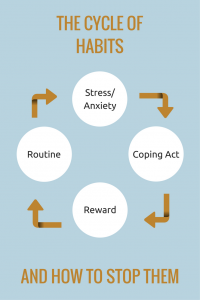Breaking Bad Habits: Why It’s So Hard to Change
by News in Health
Takeaways
The Facts
- Habits can be good and bad
- Habits are automatic behaviors that can sometimes allow our brain to focus on other information
- Habits develop when events trigger the brain’s “reward” centers
- Both good and bad habits use the same brain mechanisms, but pleasure-based habits are harder to break because they cause the brain to release dopamine and create a cycle of craving
- Humans have agency – there are brain regions that help us do what’s best for our health
Solutions
- Regularly practicing different types of self-control makes your willpower stronger
- Become aware of your unhealthy habits
- Set plans in place that prepare you for when you come face-to-face with your bad habit
- Mentally practice good habits by visualizing situations where you must overcome a bad habit
- Replace bad habits with good ones and then continue strengthening healthy behavior
Reflections
Like anyone, I have my fair share of bad habits. But I’ve also been able to break them, so I’m always eager to help others figure out how. The first step is recognizing what one’s bad habits are. Personally, mine involved over-working and over-eating. Being aware of the consequences of such behavior encouraged me to develop better ways to handle these situations, which is why I love that the article emphasizes that bad habits will always dwell in our brains. So, I’ve focused on channeling my stress into exercising and organizing my life. Now, I’m helping my aunt eat healthier by being aware of what they’re eating everyday. It’s much easier to help someone break their bad habits if you personally understand the journey. That’s why relationships and activism are so important: everything radiates outwards.

